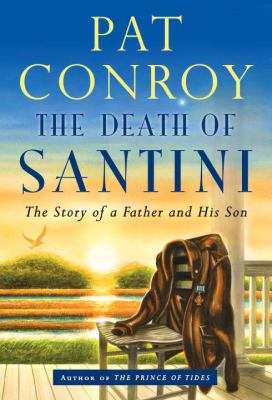 Conroy, Pat. The Death of Santini. New York: Nan A. Talese/Doubleday, 2013.
Conroy, Pat. The Death of Santini. New York: Nan A. Talese/Doubleday, 2013.
:-)! :-)! :-)! :-)! :-)!
Ahh, Pat Conroy! Not many can match him when it comes to storytelling, and no one knew better than he how to intertwine truth with fiction to make you think, “Could that be true? Surely he exaggerates! But, oh well, who cares?” I learned a long time ago, sitting around on Southern porches, listening to Southern stories, that facts (unless you were family members arguing over them, of course) were far less important than a good story.
I was eager to read this book to find out just how autobiographical Conroy’s novels (all of which I’ve loved) are. Very. In fact, reading this book makes one want to go back and reread all his novels, having gained further insight into his troubled life. I read The Great Santini nearly thirty years ago and don’t recall the abuse being so bad, but I must be wrong about that. Beach Music is probably full of clues about this second marriage, which he alludes to here as having been horrible, as well as the loss of his daughter Susannah, whose separation from her father (and his family) is a huge mystery.
Conroy comes off here as being quite insecure and apologetic. I couldn’t help wondering how much of the sensitive, caring boy was left inside the man who, on many levels — and he admits this — was so overshadowed by his father that his father became a part of him. I find it sad that he seemed to have bought into the criticism that he was not truly a good writer because a. his novels were popular and b. his novels were blatantly autobiographical. I’m not so sure either of those things is so bad, and I’m very sure, given how many books consisting of nothing but overwritten prose seem to be getting published these days, he was a great writer. I vehemently disagree with those who argued his need for a good editor.
The odd thing about this book is that I came away from it feeling like I’d learned much while at the same time learning very little. Conroy had an ingenious way of telling you about his family while also maintaining its members’ privacy. I didn’t know he had not just one, but two siblings, with schizophrenia. I didn’t know his sister was a poet (I now need to check out her poetry). I didn’t know Conroy wasn’t Southern through and through, that his father’s family was from Chicago. I didn’t know he would have been shipped off to fight in Viet Nam had he not been color blind. So, I got all this interesting new information about him but still found myself asking, “But why? Why did he/she do that? How, exactly, did you wind up there? Why did you describe him/her thus?” I think he had a great understanding that not all stories were his to tell.
Ultimately, this book is exactly what its subtitle suggests, “The Story of a Father and His Son.” It’s a sad story of an egotistical, angry, proud, violent man who believed his family members should love him and couldn’t understand why they didn’t know how much they did. And it’s the story of his son, who spent a lifetime struggling not to hate him, a son who suffered breakdowns over the difficult relationship with his father, which caused problems in all his familial relationships. Pat Conroy was a man crying out for love, and like his father, he seemed completely confused by family members who didn’t understand how much he loved them. Conroy was an angrier man than I realized, but I think what that really meant was that he was a depressed man.
He stated in this book that he didn’t believe in happy families. I’m often inclined to agree with that sentiment, but I also happen to believe there are unhappy families who wallow in their misery, while there are others who strive to be happy, to grow, to change, to keep their love strong. His family was one that spent a lifetime just trying to survive, which makes for good storytelling, but also makes for beaten souls.
Pat Conroy died last year, and I’m saddened this was his last full-length work before that happened. I, for one, certainly miss him. I hope, though, that his beaten soul has finally found some peace.

Leave a comment
Comments feed for this article